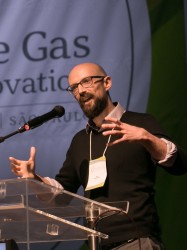BibTex format
@article{Rosselot:2023:10.1021/acssuschemeng.3c04269,
author = {Rosselot, KS and Balcombe, P and Ravikumar, AP and Allen, DT},
doi = {10.1021/acssuschemeng.3c04269},
journal = {ACS Sustainable Chemistry and Engineering},
pages = {15632--15643},
title = {Simulating the Variability of Methane and CO<inf>2</inf> Emissions from Liquefied Natural Gas Shipping: A Time-in-Mode and Carrier Technology Approach},
url = {http://dx.doi.org/10.1021/acssuschemeng.3c04269},
volume = {11},
year = {2023}
}

